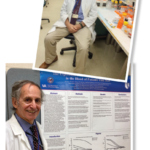It is well known by rheumatologists that heart disease is associated with the connective tissue diseases. Now, researchers at the University of Arkansas for Medical Sciences have shown that patients with rheumatoid arthritis (RA) are 60% more likely to develop atrial fibrillation than those without RA.
The findings were presented in May 2011 at the Heart Rhythm Society meeting in San Francisco, Calif. by one of the co-authors of the study, Abhishek Deshmukh, MD, a cardiology fellow at the University of Arkansas. He tells The Rheumatologist that the findings remind rheumatologists and patients with RA to keep watch on any symptoms of atrial fibrillation, such as racing heart and shortness of breath.
“This is an important study because it’s further evidence that these are systemic diseases that also can affect the heart,” comments Davis S. Pisetsky, MD, PhD, professor of medicine and immunology at Duke University Medical Center in Durham, N.C., and editor of The Rheumatologist.
Dr. Pisetsky says RA is associated with heart disease, and one manifestation of heart disease can be atrial fibrillation. “So, you might be expected to find an increase in A fib [atrial fibrillation] in people with diseases known to be associated. Nonetheless, this study is important because it’s how you interpret symptoms, what kind of work-up you would do, the medications you would give, and what other risk factors you would look for.”
Although he thinks it is interesting that the researchers picked up this association, he notes that medical science is already aware of the increase in heart disease in these patients. “So,” he notes, “is this because they had atherosclerosis, or is there an inflammatory process going on that’s different from atherosclerosis that would not be known?”
Dr. Deshmukh says that “despite adjusting for coronary artery disease, we still showed an association of atrial fibrillation and RA.”
Dr. Pisetsky points out that performing studies to pinpoint the cause of the inflammation would be difficult because there are not many ways to look at the tissue for inflammation of the heart or conducting system. “We have a lot of good ways to look at what happens to the vasculature of the heart, and if you saw atherosclerosis—which you’d expect to since these are conditions that have more atherosclerosis—you would likely ascribe the inflammation to atherosclerosis,” he says. “It would be hard to say there is something else going on. Having said that, regular cardiovascular disease has a lot of inflammation.”
The researchers had suspected that atrial fibrillation might be linked to connective tissue disease because conditions such as RA cause inflammation. To validate their hypothesis, they used data from the 2008 Nationwide Inpatient Sample, which contains discharge data from about 1,000 hospitals in 40 states. They looked at discharge diagnosis of RA, systemic lupus erythematosus (SLE), and atrial fibrillation, and compared 86,497 patients with primary atrial fibrillation to 100,000 randomly selected controls. The researchers found that 2.73% of patients with RA were found to have atrial fibrillation, compared with 1.7% for those without RA. They did not find as significant an association between SLE and atrial fibrillation.
According to Dr. Pisetsky, a key limitation of the study was that it looked only at hospitalized people, and “there may be more A fib in people not in the hospital.”
Sue Pondrom is a medical journalist based in San Diego.


